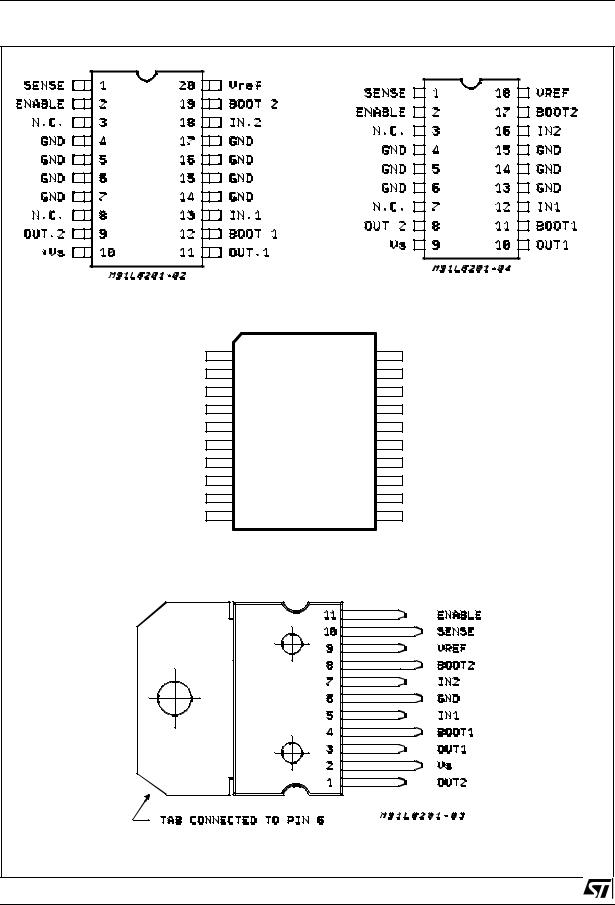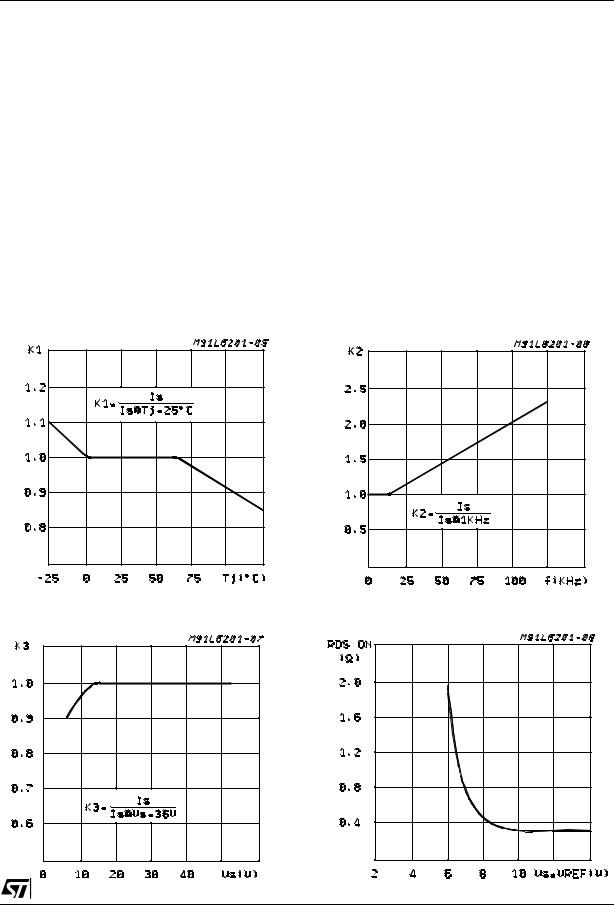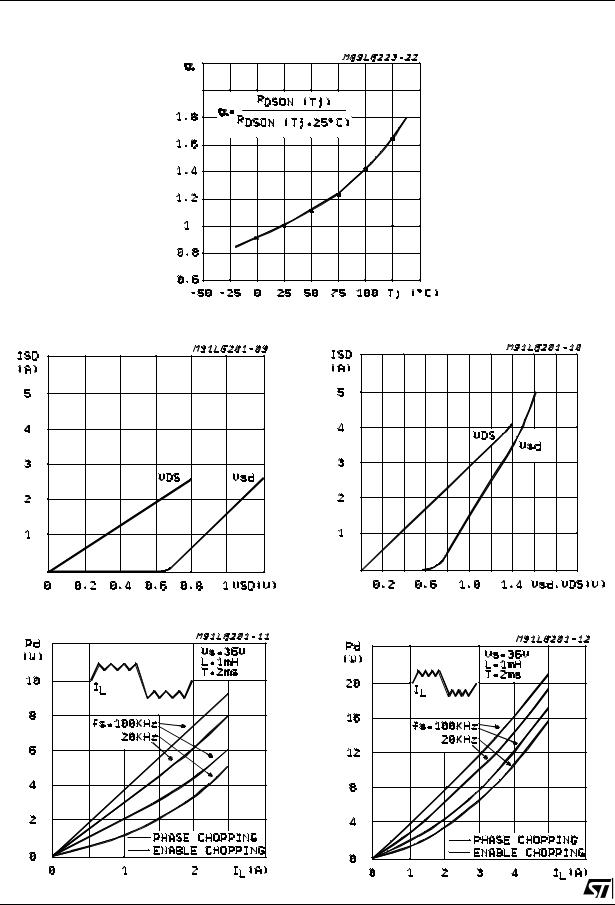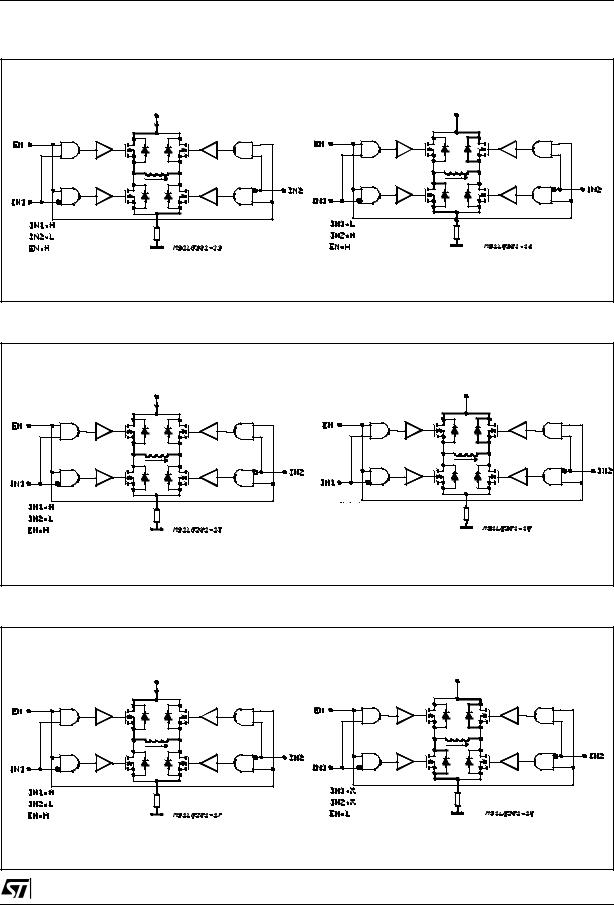STMicroelectronics L6201, L6201PS, L6202, L6203 Schematics

|
L6201 |
® |
L6202 - L6203 |
|
|
DMOS FULL BRIDGE DRIVER
SUPPLY VOLTAGE UP TO 48V
5A MAX PEAK CURRENT (2A max. for L6201) TOTAL RMS CURRENT UP TO
L6201: 1A; L6202: 1.5A; L6203/L6201PS: 4A RDS (ON) 0.3 Ω (typical value at 25 °C) CROSS CONDUCTION PROTECTION
TTL COMPATIBLE DRIVE
OPERATING FREQUENCY UP TO 100 KHz THERMAL SHUTDOWN
INTERNAL LOGIC SUPPLY HIGH EFFICIENCY
DESCRIPTION
The I.C. is a full bridge driver for motor control applications realized in Multipower-BCD technology which combines isolated DMOS power transistors with CMOS and Bipolar circuits on the same chip. By using mixed technology it has been possible to optimize the logic circuitry and the power stage to achieve the best possible performance. The DMOS output transistors can operate at supply voltages up to 42V and efficiently at high switch-
MULTIPOWER BCD TECHNOLOGY
Powerdip 12+3+3 |
SO20 (12+4+4) |
Multiwatt11 |
PowerSO20 |
ORDERING NUMBERS:
L6201 (SO20)
L6201PS (PowerSO20)
L6202 (Powerdip18)
L6203 (Multiwatt)
ing speeds. All the logic inputs are TTL, CMOS and μC compatible. Each channel (half-bridge) of the device is controlled by a separate logic input, while a common enable controls both channels. The I.C. is mounted in three different packages.
BLOCK DIAGRAM
July 2003 |
1/20 |

L6201 - L6202 - L6203
PIN CONNECTIONS (Top view)
SO20 |
|
|
POWERDIP |
GND |
1 |
20 |
GND |
N.C. |
2 |
19 |
N.C. |
N.C. |
3 |
18 |
N.C. |
OUT2 |
4 |
17 |
ENABLE |
VS |
5 |
16 |
SENSE |
OUT1 |
6 |
15 |
Vref |
BOOT1 |
7 |
14 |
BOOT2 |
IN1 |
8 |
13 |
IN2 |
N.C. |
9 |
12 |
N.C. |
GND |
10 |
11 |
GND |
|
|
D95IN216 |
|
|
|
PowerSO20 |
|
|
|
MULTIWATT11 |
|
2/20 |
|
|
|

|
|
|
|
|
|
L6201 - L6202 - L6203 |
PINS FUNCTIONS |
|
|
|
|
||
|
|
|
|
|
|
|
|
Device |
|
Name |
Function |
||
|
|
|
|
|
||
L6201 |
L6201PS |
|
L6202 |
L6203 |
||
|
|
|
||||
1 |
16 |
|
1 |
10 |
SENSE |
A resistor Rsense connected to this pin provides feedback for |
|
|
|
|
|
|
motor current control. |
|
|
|
|
|
|
|
2 |
17 |
|
2 |
11 |
ENAB |
When a logic high is present on this pin the DMOS POWER |
|
|
|
|
|
LE |
transistors are enabled to be selectively driven by IN1 and IN2. |
3 |
2,3,9,12, |
|
3 |
|
N.C. |
Not Connected |
|
18,19 |
|
|
|
|
|
4,5 |
– |
|
4 |
|
GND |
Common Ground Terminal |
|
|
|
|
|
|
|
– |
1, 10 |
|
5 |
6 |
GND |
Common Ground Terminal |
|
|
|
|
|
|
|
6,7 |
– |
|
6 |
|
GND |
Common Ground Terminal |
|
|
|
|
|
|
|
8 |
– |
|
7 |
|
N.C. |
Not Connected |
|
|
|
|
|
|
|
9 |
4 |
|
8 |
1 |
OUT2 |
Ouput of 2nd Half Bridge |
|
|
|
|
|
|
|
10 |
5 |
|
9 |
2 |
Vs |
Supply Voltage |
11 |
6 |
|
10 |
3 |
OUT1 |
Output of first Half Bridge |
|
|
|
|
|
|
|
12 |
7 |
|
11 |
4 |
BOOT1 |
A boostrap capacitor connected to this pin ensures efficient |
|
|
|
|
|
|
driving of the upper POWER DMOS transistor. |
|
|
|
|
|
|
|
13 |
8 |
|
12 |
5 |
IN1 |
Digital Input from the Motor Controller |
|
|
|
|
|
|
|
14,15 |
– |
|
13 |
|
GND |
Common Ground Terminal |
|
|
|
|
|
|
|
– |
11, 20 |
|
14 |
6 |
GND |
Common Ground Terminal |
|
|
|
|
|
|
|
16,17 |
– |
|
15 |
|
GND |
Common Ground Terminal |
|
|
|
|
|
|
|
18 |
13 |
|
16 |
7 |
IN2 |
Digital Input from the Motor Controller |
|
|
|
|
|
|
|
19 |
14 |
|
17 |
8 |
BOOT2 |
A boostrap capacitor connected to this pin ensures efficient |
|
|
|
|
|
|
driving of the upper POWER DMOS transistor. |
|
|
|
|
|
|
|
20 |
15 |
|
18 |
9 |
Vref |
Internal voltage reference. A capacitor from this pin to GND is |
|
|
|
|
|
|
recommended. The internal Ref. Voltage can source out a |
|
|
|
|
|
|
current of 2mA max. |
|
|
|
|
|
|
|
ABSOLUTE MAXIMUM RATINGS
Symbol |
|
Parameter |
Value |
Unit |
|
|
|
|
|
Vs |
Power Supply |
|
52 |
V |
VOD |
Differential Output Voltage (between Out1 and Out2) |
60 |
V |
|
|
|
|
|
|
VIN, VEN |
Input or Enable Voltage |
|
– 0.3 to + 7 |
V |
|
|
|
|
|
Io |
Pulsed Output Current |
for L6201PS/L6202/L6203 (Note 1) |
5 |
A |
|
– Non Repetitive (< 1 ms) for L6201 |
5 |
A |
|
|
|
for L6201PS/L6202/L6203 |
10 |
A |
|
DC Output Current |
for L6201 (Note 1) |
1 |
A |
|
|
|
|
|
Vsense |
Sensing Voltage |
|
– 1 to + 4 |
V |
|
|
|
|
|
Vb |
Boostrap Peak Voltage |
|
60 |
V |
Ptot |
Total Power Dissipation: |
|
|
|
|
Tpins = 90°C for L6201 |
|
4 |
W |
|
for L6202 |
|
5 |
W |
|
Tcase = 90°C for L6201PS/L6203 |
20 |
W |
|
|
Tamb = 70°C for L6201 (Note 2) |
0.9 |
W |
|
|
for L6202 (Note 2) |
1.3 |
W |
|
|
for L6201PS/L6203 (Note 2) |
2.3 |
W |
|
|
|
|
|
|
Tstg, Tj |
Storage and Junction Temperature |
– 40 to + 150 |
°C |
|
|
|
|
|
|
Note 1: Pulse width limited only by junction temperature and transient thermal impedance (see thermal characteristics) Note 2: Mounted on board with minimized dissipating copper area.
3/20

L6201 - L6202 - L6203
THERMAL DATA
Symbol |
Parameter |
|
|
Value |
|
Unit |
|
|
L6201 |
L6201PS |
L6202 |
L6203 |
|||
|
|
|
|
||||
Rth j-pins |
Thermal Resistance Junction-pins |
max |
15 |
– |
12 |
– |
°C/W |
Rth j-case |
Thermal Resistance Junction Case |
max. |
– |
– |
– |
3 |
|
Rth j-amb |
Thermal Resistance Junction-ambient |
max. |
85 |
13 (*) |
60 |
35 |
|
(*) Mounted on aluminium substrate.
ELECTRICAL CHARACTERISTICS (Refer to the Test Circuits; Tj = 25°C, VS = 42V, Vsens = 0, unless otherwise specified).
Symbol |
Parameter |
|
Test Conditions |
|
Min. |
Typ. |
Max. |
Unit |
|||
|
|
|
|
|
|
|
|
|
|
|
|
Vs |
Supply Voltage |
|
|
|
|
|
12 |
36 |
48 |
V |
|
Vref |
Reference Voltage |
IREF = 2mA |
|
|
|
|
13.5 |
|
V |
||
IREF |
Output Current |
|
|
|
|
|
|
|
2 |
mA |
|
|
|
|
|
|
|
|
|
|
|||
Is |
Quiescent Supply Current |
EN = H VIN = L |
|
|
|
10 |
15 |
mA |
|||
|
|
|
EN = H VIN = H |
IL = 0 |
|
10 |
15 |
mA |
|||
|
|
|
EN = L ( Fig. 1,2,3) |
|
|
|
8 |
15 |
mA |
||
|
|
|
|
|
|
|
|
|
|
|
|
fc |
Commutation Frequency (*) |
|
|
|
|
|
|
30 |
100 |
KHz |
|
Tj |
Thermal Shutdown |
|
|
|
|
|
|
150 |
|
°C |
|
Td |
Dead Time Protection |
|
|
|
|
|
|
100 |
|
ns |
|
TRANSISTORS |
|
|
|
|
|
|
|
|
|
||
|
|
|
|
|
|
|
|
|
|
|
|
OFF |
|
|
|
|
|
|
|
|
|
|
|
|
|
|
|
|
|
|
|
|
|||
IDSS |
Leakage Current |
Fig. 11 Vs = 52 V |
|
|
|
|
1 |
mA |
|||
|
|
|
|
|
|
|
|
|
|
|
|
ON |
|
|
|
|
|
|
|
|
|
|
|
|
|
|
|
|
|
|
|
|
|
||
RDS |
On Resistance |
Fig. 4,5 |
|
|
|
|
0.3 |
0.55 |
Ω |
||
|
|
|
|
|
|
|
|
|
|
||
VDS(ON) |
Drain Source Voltage |
Fig. 9 |
|
|
L6201 |
|
|
|
|
||
|
|
|
IDS = 1A |
|
|
|
0.3 |
|
V |
||
|
|
|
IDS = 1.2A |
|
|
L6202 |
|
0.36 |
|
V |
|
|
|
|
IDS = 3A |
|
L6201PS/0 |
|
0.9 |
|
V |
||
|
|
|
|
|
|
|
3 |
|
|
|
|
Vsens |
Sensing Voltage |
|
|
|
|
|
– 1 |
|
4 |
V |
|
|
|
|
|
|
|
|
|
|
|
|
|
SOURCE DRAIN DIODE |
|
|
|
|
|
|
|
|
|
||
|
|
|
|
|
|
|
|
|
|||
Vsd |
Forward ON Voltage |
Fig. 6a and b |
|
|
|
|
|
|
|||
|
|
|
ISD = 1A |
L6201 |
EN = L |
|
0.9 (**) |
|
V |
||
|
|
|
ISD = 1.2A |
L6202 |
EN = L |
|
0.9 (**) |
|
V |
||
|
|
|
ISD = 3A |
L6201PS/03 |
EN = |
|
1.35(**) |
|
V |
||
|
|
|
L |
|
|
|
|
|
|
|
|
trr |
Reverse Recovery Time |
dif = 25 A/μs |
|
|
|
300 |
|
ns |
|||
|
|
|
|
|
|
|
|
|
|||
|
|
|
dt |
|
|
|
|
|
|
|
|
|
|
|
IF = 1A |
|
L6201 |
|
|
|
|
||
|
|
|
IF = 1.2A |
|
L6202 |
|
|
|
|
||
|
|
|
IF = 3A |
|
L6203 |
|
|
|
|
||
tfr |
Forward Recovery Time |
|
|
|
|
|
|
200 |
|
ns |
|
|
|
|
|
|
|
|
|
|
|
|
|
LOGIC LEVELS |
|
|
|
|
|
|
|
|
|
||
|
|
|
|
|
|
|
|
|
|
|
|
VIN L, |
VEN L |
Input Low Voltage |
|
|
|
|
|
– 0.3 |
|
0.8 |
V |
|
|
|
|
|
|
|
|
|
|
|
|
VIN H, |
VEN H |
Input High Voltage |
|
|
|
|
|
2 |
|
7 |
V |
|
|
|
|
|
|
|
|
|
|
|
|
IIN L, |
IEN L |
Input Low Current |
VIN, |
VEN = L |
|
|
|
|
–10 |
μA |
|
IIN H, |
IEN H |
Input High Current |
VIN, |
VEN = H |
|
|
|
30 |
|
μA |
|
4/20

L6201 - L6202 - L6203
ELECTRICAL CHARACTERISTICS (Continued)
LOGIC CONTROL TO POWER DRIVE TIMING
Symbol |
Parameter |
|
Test Conditions |
Min. |
Typ. |
Max. |
Unit |
|
|
|
|
|
|
|
|
|
|
t1 (Vi) |
Source Current Turn-off Delay |
Fig. 12 |
|
|
300 |
|
ns |
|
t2 (Vi) |
Source Current Fall Time |
Fig. 12 |
|
|
200 |
|
ns |
|
t3 (Vi) |
Source Current Turn-on Delay |
Fig. 12 |
|
|
400 |
|
ns |
|
t4 (Vi) |
Source Current Rise Time |
Fig. 12 |
|
|
200 |
|
ns |
|
|
|
|
|
|
|
|
|
|
t5 |
(Vi) |
Sink Current Turn-off Delay |
Fig. 13 |
|
|
300 |
|
ns |
|
|
|
|
|
|
|
|
|
t6 |
(Vi) |
Sink Current Fall Time |
Fig. 13 |
|
|
200 |
|
ns |
|
|
|
|
|
|
|
|
|
t7 |
(Vi) |
Sink Current Turn-on Delay |
Fig. 13 |
|
|
400 |
|
ns |
t8 |
(Vi) |
Sink Current Rise Time |
Fig. 13 |
|
|
200 |
|
ns |
(*) Limited by power dissipation
(**) In synchronous rectification the drain-source voltage drop VDS is shown in fig. 4 (L6202/03); typical value for the L6201 is of 0.3V.
Figure 1: Typical Normalized IS vs. Tj |
Figure 3: Typical Normalized IS vs. VS |
Figure 2: Typical Normalized Quiescent Current
vs. Frequency
Figure 4: Typical RDS (ON) vs. VS ~ Vref
5/20

L6201 - L6202 - L6203
Figure 5: Normalized RDS (ON)at 25°C vs. Temperature Typical Values
Figure 6a: Typical Diode Behaviour in Synchronous Rectification (L6201)
Figure 6b: Typical Diode Behaviour in Synchronous Rectification (L6201PS/02/03)
Figure 7a: Typical Power Dissipation vs IL (L6201)
Figure 7b: Typical Power Dissipation vs IL |
(L6201PS, L6202, L6203)) |
6/20

L6201 - L6202 - L6203
Figure 8a: Two Phase Chopping
Figure 8b: One Phase Chopping
IN1 = H |
IN 2 = H |
EN = H |
Figure 8c: Enable Chopping
7/20 |
